Smell is the most emotionally loaded sense we have. It can bring back entire moments—faces, places, even exact emotions—with just one breath. Unlike sound or sight, which are processed rationally, scent goes straight to the limbic system, where memory and emotion live. That’s why a familiar fragrance can suddenly make you feel something you haven’t felt in years.
This connection isn’t just poetic—it’s biological. And in everyday life, it means your fragrance isn’t just about how you smell. It’s about how you’re remembered. People don’t just notice your scent in the moment. It lingers in their memory, long after you’ve left the room.
As a result, many fragrance enthusiasts are moving away from one-signature-scent mindsets and toward flexible options like a perfume subscription. By regularly rotating fragrances, they’re better able to match scent to mood, season, and life moments—and in turn, create a richer scent-memory map.
How Fragrance Becomes Part of Your Story
You don’t just remember events through visuals or sounds. You remember them through smell. The perfume you wore on a first date, during a job interview, or while traveling becomes permanently tied to those memories. Over time, scent functions as a marker of your life’s timeline.
Some people keep empty bottles of their favorite fragrances, not for the packaging, but because the scent clinging to the glass still brings them back to a particular chapter of life. That emotional trigger is powerful. Even years later, that scent can feel like revisiting yourself at a different time.
This isn’t nostalgia for the sake of it. It’s scent as documentation. A quiet form of emotional journaling that requires no words.
The Role of Fragrance in Mood and Memory Formation
You might remember how you felt more than what actually happened—and fragrance plays into that. Certain scents make us feel calm, energized, sensual, or safe. When worn during emotional moments, those feelings lock into memory more vividly.
For example, lavender can calm the nervous system, which makes memories made under its influence feel softer. Spicy scents like cinnamon may raise alertness, making experiences feel sharper and more intense. Scent doesn’t just decorate a moment—it changes how you encode it.
That’s why intentional fragrance use is gaining traction. More people are using scent as a way to manage mood, enhance experiences, or shift energy during their day. When your goal is to be fully present in a moment, what you smell matters.
Why We Revisit Old Scents
It’s common to revisit old perfumes, especially ones tied to powerful memories. People repurchase fragrances from their youth, their travels, or even ones worn by loved ones. It’s not always about liking the scent in a traditional sense—it’s about accessing the emotional imprint it carries.
This explains the emotional weight behind certain smells. They’re more than pleasant—they’re portals. One spritz and you’re back in college, back in a childhood home, back with someone you once loved. This emotional connection is rarely discussed in marketing, but it’s one of the biggest reasons people stay loyal to certain notes or return to them after years.
Creating a Scent Map for Your Life
Some scent lovers build an intentional “scent diary.” This isn’t a literal journal—it’s a habit of assigning specific fragrances to specific moments. A different scent for each season, each milestone, each chapter. Over time, this creates a kind of emotional map. One that doesn’t live in ink, but in the body’s sensory memory.
To do this, flexibility is essential. You need a broad library of fragrances to choose from. That’s one reason perfume subscription services have grown in popularity. They allow people to explore many different fragrances without committing to full-size bottles, enabling scent to evolve with the person using it.
When each fragrance becomes a chapter, every bottle holds more than scent—it holds memory.
Scent, Grief, and Emotional Recall
The emotional link between scent and memory isn’t always pleasant. Sometimes, it’s painful. Smelling a fragrance worn by someone who’s no longer in your life can bring grief to the surface faster than any photograph. That intensity is what makes scent both beautiful and brutal. It reminds you of what you once had—even if you didn’t realize you were holding onto it.
But even here, scent has a role. It can become part of healing. For some, revisiting a lost loved one’s fragrance helps preserve connection. For others, choosing new scents marks emotional progress—a way to move forward without forgetting the past.
Fragrance, in this case, becomes ritual. A sensory ceremony of remembrance, release, or reinvention.
Passing Down Scent Across Generations
Perfume isn’t just for the present. It gets passed down. Many people associate certain notes with their parents, grandparents, or cultural traditions. Scent, in this way, becomes part of heritage. Not through genetics, but through daily presence—what your mother wore, what your grandfather applied every morning.
Those associations don’t fade. They shape your own taste in fragrance. They inform what feels “right,” what feels “home,” and what feels unfamiliar. In this way, scent continues to write your memory long after a bottle is empty.



Comments